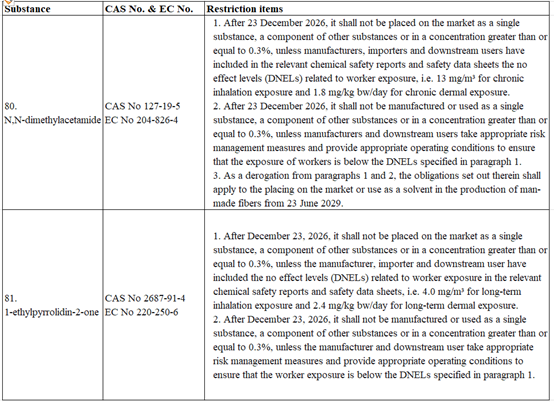On June 2, 2025, the European Commission officially promulgated Regulation (EU) 2025/1090, imposing new restrictions on the use of N, N-dimethylacetamide (DMAC) and 1-ethylpyrrolidin-2-one (NEP).
This regulation is a revision of Annex XVII (Restriction List) of the Regulation of the European Parliament and the Council of December 18, 2006 on the Registration, Evaluation, Authorization and Restriction of Chemicals (REACH Regulation, (EC) No 1907/2006).
The following items are added to the restriction list of (EC) No 1907/2006:
This regulation will take effect on the twentieth day after its publication in the EU Official Journal. It is generally binding and directly applicable to all member states.
Corporate response measures:
1. Comprehensively check product ingredients: immediately set up a professional team to conduct a comprehensive screening of products and supply chains to determine whether they contain DMAC or NEP and whether their concentration reaches the limit threshold of 0.3%.
2. Timely update key documents: before December 23, 2026, update the new DNELs (values for long-term inhalation exposure and long-term skin exposure) to the safety data sheet (SDS) and chemical safety report (CSR), and improve product usage scenarios and risk control instructions.
3. Strengthen worker exposure risk control: Conduct occupational exposure risk assessment for production links using DMAC and NEP. Introduce engineering control measures, such as local exhaust systems; equip workers with personal protective equipment, such as protective gloves, masks, etc., to ensure that workers’ exposure meets the standards.
4. Special response for special industries: Man-made fiber manufacturers should complete the technical replacement or process equipment upgrade of DMAC solvents before June 23, 2029 to address the risk of inhalation exposure.
5. Supply chain communication and risk sharing: timely communicate with upstream and downstream companies about regulatory changes, clarify the requirements for the use of raw materials, jointly explore and develop low-risk alternatives, notify downstream users of restriction clauses, and ensure compliance of the entire chain.
6. Monitoring and recording: Regularly monitor workplace exposure levels, retain relevant monitoring data and compliance certification documents for inspection by relevant EU departments.
Help from TTS third-party inspection and testing agencies:
1. Provide professional testing services: help companies detect the content of DMAC and NEP in products, ensure that the test results are accurate and reliable, and provide compliance basis for companies. At the same time, regular sampling of raw materials, semi-finished products and finished products can be carried out according to the needs of the company to promptly identify potential compliance risks.
2. Provide certification services: If an enterprise needs relevant certification to prove that its products comply with REACH regulations, TTS can provide certification services, such as CE certification, to enhance the competitiveness of the enterprise’s products in the EU market.
Post time: Jun-09-2025






